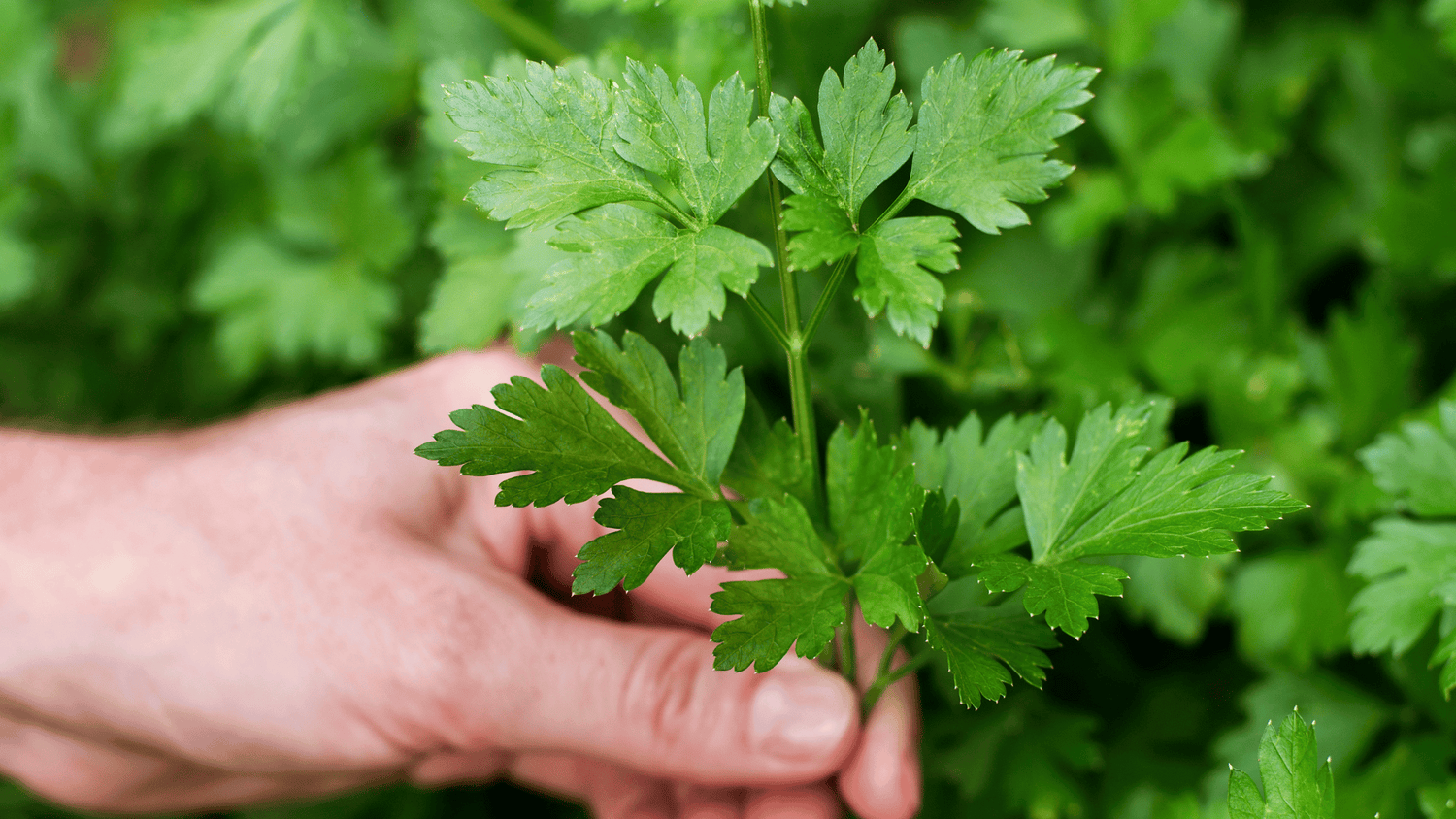Ever wondered if plants hold the secret to better health? Turns out, they just might! Meet apigenin, the rockstar flavonoid found in various plants and supplements. This little hero has been turning heads with its potential to fend off chronic illnesses and promote longevity.
In this article, we will journey into the world of apigenin. From where it hides in plants to how it might be your ticket to a healthier longer living you. So, let's dive in and discover the wonders and how to pair it with NMN for powerful health benefits!
What is apigenin?
Apigenin is a natural flavonoid compound that belongs to a class of plant chemicals known as flavonoids. It is commonly found in various fruits and vegetables, particularly in parsley, celery, chamomile tea, and some fruits like apples and oranges. It is well-known for its potential health benefits and has been studied for its antioxidant, anti-inflammatory, and potential anticancer properties.
Research suggests that apigenin may play a role in various biological processes, including reducing oxidative stress, inflammation and promoting cellular health. It is also being investigated for its potential to support cognitive function and heart health.
Moreover, apigenin has gained attention for its interaction with NMN (Nicotinamide Mononucleotide), a molecule involved in cellular metabolism and energy production. Some studies suggest that apigenin may enhance the effectiveness of NMN in promoting cellular energy production and longevity, although more research is needed in this area (R, R, R).
What are the benefits of apigenin supplements?
Apigenin supplements have gained attention for their potential health benefits. Some of the potential benefits include:
Antioxidant Properties: Apigenin is known for its antioxidant properties, which means it can help neutralise harmful free radicals in the body. This may reduce oxidative stress and the risk of chronic diseases (R).
Anti-Inflammatory Effects: Apigenin has been studied for its anti-inflammatory properties, which may help reduce inflammation in the body. Chronic inflammation is associated with a range of health issues (R).
Cancer Prevention: Some studies suggest that it may have anticancer properties. It has been investigated for its potential to inhibit the growth of cancer cells and induce apoptosis (cell death) in specific cancer types (R, R).
Heart Health: It may help promote heart health by improving cholesterol levels, reducing blood pressure, and protecting against oxidative stress and inflammation (R).
Neuroprotection: Some evidence suggests that it may have neuroprotective properties, potentially supporting cognitive function and protecting against neurodegenerative diseases like Alzheimer's (R, R).
Anxiety and Sleep: Studies suggest it may have mild anxiolytic (anxiety-reducing) effects and may help with sleep. Some research indicates that it can bind to certain brain receptors involved in these processes (R).
Weight Management: It may influence metabolism and appetite regulation, potentially aiding in weight management efforts (R).
Skin Health: Topical applications have been explored for their potential to improve skin health, reduce inflammation, and provide antioxidant benefits (R, R).
We know there are some potentially excellent health benefits. But where can we get this magic compound from?
What foods contain apigenin?
Here is a list of some common foods that contain apigenin:
-
Parsley: Parsley is one of the richest dietary sources. Both curly parsley and flat-leaf (Italian) parsley varieties contain significant amounts (R).
-
Celery: Celery is another vegetable that contains apigenin. It's often used in salads, soups, and snacks (R).
-
Chamomile Tea: Chamomile tea is well-known for its content. This herbal tea is made from dried chamomile flowers (R).
-
Apples: Eating apples with the skin on can provide this flavonoid (R).
-
Oranges: Oranges, particularly the zest or peel, contain apigenin (R).
-
Onions: Onions are a wonderful source, especially when consumed raw. Red onions have higher levels than yellow or white onions (R).
-
Tomatoes: Tomatoes, especially cherry tomatoes and their skins, contain apigenin. Cooking tomatoes can also release more from the fruit (R).
-
Cabbage: Cabbage, particularly red cabbage. It is commonly used in salads, coleslaw, and stir-fries (R, R).
-
Spinach: Spinach and various other leafy greens contain apigenin (R).
-
Thyme: Thyme is a herb used in cooking and seasoning (R).
-
Oregano: Oregano is another herb that contains apigenin and is commonly used in Mediterranean cuisine (R).
-
Mint: Mint leaves, such as spearmint and peppermint. These are often used to make herbal teas or garnish (R).
-
Coriander (Cilantro): Coriander leaves, commonly known as cilantro. These leaves are used in various cuisines worldwide (R).
-
Basil: Basil leaves, used in dishes like pesto (R).
-
Dill: Dill is a herb used in various culinary applications (R).
It's worth noting that the content of this flavonoid in these foods can vary depending on factors like variety, ripeness, and cooking methods. To maximise your intake, consider including a variety of these foods in your diet.
Are there any side effects from apigenin?
Apigenin is generally safe when consumed moderately or as part of a balanced diet. It has a long history of safe human consumption with no significant adverse effects reported. However, caution is necessary for specific situations.
Allergies can be a concern for some individuals. Apigenin can also interact with specific medications, particularly those metabolised by liver enzymes. Therefore, consulting with a healthcare provider, especially when taking medications susceptible to grapefruit or citrus juice interactions, is advisable. It may also mildly thin the blood, potentially affecting those on anticoagulant medications.
In most cases, apigenin from a balanced diet is safe. However, consult a healthcare professional if you are considering supplementing for therapeutic purposes or have specific health concerns.
Apigenin supplement: How much to take?
The appropriate dosage can vary based on individual factors like age, overall health, and the intended purpose. There is no established Recommended Dietary Allowance (RDA). Generally, beginning with low doses and increasing gradually if necessary is advised. Apigenin supplements come in various forms with varying concentrations, so following the dosing instructions on the product label is essential (R).
How Does Apigenin Work With NMN?
The interaction between these two is an area of ongoing research. Here is what we know so far about how it works:
Cellular Energy Production: NMN is a precursor to a molecule called NAD+ (Nicotinamide Adenine Dinucleotide). Some studies suggest that apigenin may enhance the effectiveness of NMN in raising NAD+ levels within cells by inhibiting the enzyme CD38. This can promote better cellular energy metabolism (R, R, R).
Antioxidant Effects: Both apigenin and NMN have antioxidant properties. Apigenin's antioxidant activity may complement NMN's role in reducing oxidative stress within cells. By reducing oxidative stress, this combination may help protect cells from damage and support overall cellular health (R).
Anti-Inflammatory Properties: Apigenin is known for its anti-inflammatory properties, and chronic inflammation can contribute to various age-related diseases. Combined with NMN, it may help reduce inflammation within the body, potentially promoting overall health and longevity (R, R).
Potential for Cellular Repair: Some studies suggest combining apigenin and NMN may support cellular repair mechanisms crucial for maintaining healthy tissues and organs (R).
Cognitive Benefits: Apigenin's potential neuroprotective effects and NMN's role in cellular energy production may affect cognitive function and brain health. However, more research is needed to confirm these effects (R).
In conclusion, this remarkable flavonoid, offers a multitude of potential health benefits, ranging from antioxidant and anti-inflammatory properties to cancer prevention, heart health support, neuroprotection, and even assistance with anxiety, sleep, weight management, and skin health.
In your quest for a healthier, longer life, consider exploring the potential of apigenin and its fascinating interactions with NMN. As the scientific community continues to unravel the mysteries of these compounds, we may find even more ways to enhance our well-being and unlock the secrets of a vibrant, healthy life.





